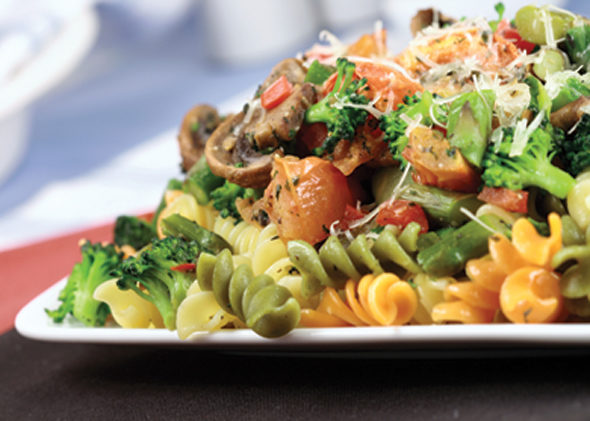Vegetarianism and veganism are increasingly common lifestyle choices, while raw foods constitutes a health craze that is gaining in popularity. But practitioners of the three diets discussed in this article are all likely looking, at least in part, to further their wellbeing. Consumers in these categories also want products that let them enjoy their diets with greater ease and pleasure. If they aren’t aware of how to reap the health benefits of these diets, or aren’t sure where to turn for palette-pleasing options, retailers can be their best source of information. 
Eating Your Fill
Once they get started, it can be hard to stop advocates from listing the benefits of a vegetarian diet. In addition to the ethical and environmental reasons behind such diets for some people, one of the main points of attraction is the wealth of culinary opportunities available. This may run counter to popular notions, which hold that restricted diets like vegetarianism (and its many variations) create inflexible and difficult-to-maintain lifestyles. On the contrary, many contend that variety, whether it’s within a strict vegan diet or a dairy-inclusive vegetarian regimen, is one of the first selling points.
Part of the growing acceptance of the diet is due to the number of choices and styles of vegetarian cooking, according to Veronica Bosgraaf, founder of Pure Bar, Newport Beach, CA. “A balanced vegetarian diet also fills you up and gives your body the nutrients it needs, so it helps eliminate cravings and overeating,” Bosgraaf adds. Variety within a restricted diet is not only stimulating to individuals, it is also essential for maintaining proper nutrition.
Mike Ryan, vice president of marketing for Tandoor Chef, Union, NJ, attests to the idea that these dietary choices can do wonders for one’s chances at long-term health. He cites reports from the American Dietetic Association stating that vegetarian and vegan diets are associated with reducing the risk of heart disease, colon and lung cancer, osteoporosis, diabetes, kidney disease, hypertension, obesity and other diseases. His company’s Indian cuisine products commonly overlap with many vegetarian staples. “Vegetarian consumers make up a large percentage of both the Indian and American population, yet truly healthy vegetarian dining options remain limited—especially when it comes to eating at home.”
This need for maneuverability, when leading a healthy vegan/vegetarian lifestyle, is easily fulfilled with a little knowledge. There are plenty of ways to keep things fresh and balanced by sticking to the mainstay categories that most vegetarians learn to treasure. For starters, there are versatile and highly nutritious whole grains to consider. Whole grains are simply in a higher echelon of healthfulness than over-processed grains, according to Ray Martin, vice president of sales and marketing at Hodgson Mill, Effingham, IL. This processing can remove many of the naturally occurring attributes of the grain kernels that add nutritional value.
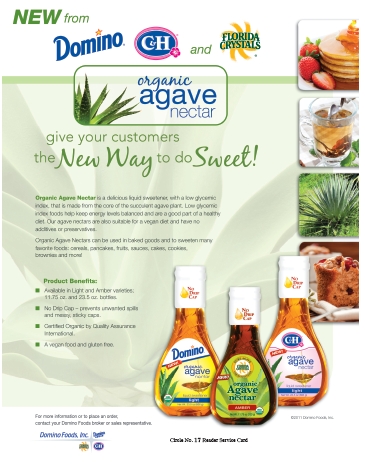 Martin explains that his company’s whole wheat flours and meals allow dieters to bake with variety and good nutrition in tandem. Says Martin, “Whole grains are high in fiber, and contain manganese and magnesium.” These nutrients are among the many that are potentially lacking in the diets of vegetarians.
Martin explains that his company’s whole wheat flours and meals allow dieters to bake with variety and good nutrition in tandem. Says Martin, “Whole grains are high in fiber, and contain manganese and magnesium.” These nutrients are among the many that are potentially lacking in the diets of vegetarians.
Whole grains are included in many food product formulations geared toward restricted-dieters. Whole wheat pastas are a popular example; Martin says his company’s pastas have nine grams of protein per serving, and that its organic and gluten-free pastas contain nutritious flax. In fact, he encourages this category as a gateway food, saying, “Pastas are a great staple for families that want to encourage their children to adopt a vegetarian or vegan lifestyle. Most children like a big bowl of pasta and tomato sauce!”
An interesting option that has yet to make its way into many products is buckwheat, according to Martin. “Buckwheat reportedly has more protein than wheat or rice, is low on the glycemic scale and contains flavonoids, which are heart healthy,” he says. Other wholesome foods that come pre-approved for vegetarian consumption from Martin are:
• ”Steel cut oats have long been recognized as being good for the heart and supporting healthy digestion. In addition, they contain potassium, magnesium, vitamin B complex and antioxidants,” he says.
• Muesli products, which consist of blends of whole grain and fruit ingredients, are a great snack for families to share out of the box, as a cereal or added to other hot cereals to add sweetness and crunch.
• Flax meal or seeds are a good source of omega-3s, fiber and lignans.
• Couscous products, such as a whole wheat variety recommended by Martin, are often available in many flavorful styles.
Exotic dishes like couscous, which originated in North Africa, are not only becoming more familiar in the average Western diet, they are becoming fast-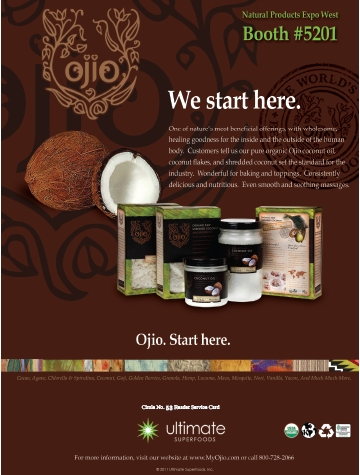 favorites of vegetarians everywhere. Manufacturers are helping to foster the introduction of these foods, including Ryan’s company which specializes in Indian cuisine. “Indian food by nature appeals to healthy eaters and those following specific diets—a wide range of Indian cuisine is vegetarian, vegan and gluten-free,” says Ryan, who continues, “That’s why we’ve introduced Balanced Vegetarian, a better-for-you initiative and an industry first.”
favorites of vegetarians everywhere. Manufacturers are helping to foster the introduction of these foods, including Ryan’s company which specializes in Indian cuisine. “Indian food by nature appeals to healthy eaters and those following specific diets—a wide range of Indian cuisine is vegetarian, vegan and gluten-free,” says Ryan, who continues, “That’s why we’ve introduced Balanced Vegetarian, a better-for-you initiative and an industry first.”
Designed to help vegetarians bring exotic tastes into the home, the meals in the product line are also nutritionally balanced, Ryan explains, with lower sodium, higher protein and fiber and no trans-fats. All of the products use olive oil and satisfy several groups in the U.S. Department of Agriculture (USDA) food pyramid, and some dishes are also vegan and gluten-free. Ryan says the meals were developed to offer nutrients that may be missing from a meatless diet, namely proteins, grains and essential vitamins B3 and B12.
Ryan contends that familiar foods like pizza, though not an option for all vegetarians and certainly not for vegans, may be a good way to transition to new cuisines with wider vegetarian options. His example is naan pizza, which could be called an Indian–Italian fusion food. He says that this marriage of the familiar and the new is appealing to consumers. “The growing popularity of samosas and other hand-held appetizers [is]…because they appeal to vegetarian consumers as a familiar snack but add an innovative new twist through exotic flavors,” Ryan says.
 Nuts can be a valuable component of every vegetarian’s diet, and are the focal point for some vegans for their nutritive content. For this reason, creating a buzz around the various nut butters available will help spread the nutrition around to your restricted-diet clientele. “Nut butters are very important to vegetarians because they contain a high value of protein and omega-3s,” says Gael Orr, communications manager for Once Again Nut Butter, Nunda, NY.
Nuts can be a valuable component of every vegetarian’s diet, and are the focal point for some vegans for their nutritive content. For this reason, creating a buzz around the various nut butters available will help spread the nutrition around to your restricted-diet clientele. “Nut butters are very important to vegetarians because they contain a high value of protein and omega-3s,” says Gael Orr, communications manager for Once Again Nut Butter, Nunda, NY.
Most people, she explains, ingest omega-3s from fish, but since the majority of vegetarians (except pesce-vegetarians) don’t eat fish, nuts are often integral for proper nutrition. Orr also says vegetarians will enjoy the filling nature of nut butters, which will help keep hunger at bay. Simply finding a favorite variety and keeping a constant supply in the kitchen can ease the burden of hunting down nutritious calories all the time.
Nut butters are easy to cook with, serving as versatile ingredients when used in a quick snack, in smoothies or as a component in any meal of the day, according to Orr. “Tahini (sesame seed butter) is high in calcium, can be used as a butter substitute and adds flavor to stir fries,” she says. Orr also suggests, for lacto-ovo (egg- and dairy-eating) vegetarians, tahini can be made into a hummus or used for egg salad in lieu of traditional mayonnaise. Not all nut butters are marketed to vegans, so dieters should verify the status of individual products if they only want vegan.
Many vegans will find comfort in products that mimic dairy favorites well, while not crossing the line of their dietary restrictions. Cream alternatives and whipped cream products that are 100% vegan are hard to come by, but products from Albany, NY-based Green Rabbit, LLC accomplish the feat. “This means that no ingredients used in their manufacture are animal sourced, including ingredients from bees. Many vegetarians will consume foods from bees, such as honey, but those following a vegan lifestyle will not,” founder and CEO Rose Anne Colavito says.
Vegans will be particularly impressed with the lengths Green Rabbit went to in securing this status for their products. Colavito explains that in its sugar-free sweetened cream, the company uses a sugar alcohol, erythritol, which is commonly derived from a non-vegan source. “Erythritol typically uses bee pollen in its fermentation processes. We searched worldwide for an erythritol that does not use pollen, but rather grapes, in this fermentation process,” she says.
Colavito explains that in its sugar-free sweetened cream, the company uses a sugar alcohol, erythritol, which is commonly derived from a non-vegan source. “Erythritol typically uses bee pollen in its fermentation processes. We searched worldwide for an erythritol that does not use pollen, but rather grapes, in this fermentation process,” she says.
An increasingly ubiquitous element in many vegetarian shopping baskets is the nutrition bar. Available in as many formulations as there are manufacturers of them, these bars are popular because of their unique combination of health value and convenience. According to one manufacturer, the goal was to make a bar not exclusively for vegetarians or vegans, but one that provides quality nutrition for everyone.
Kristen Fillat, founder and CEO of The GoodOnYa Bar, Solana Beach, CA, explains that the bar works well for restricted-dieters because of the use of hemp and nuts for protein. The bar is, in addition, totally dairy and gluten-free. “One of the best parts about our bars is that they are satisfying,” Fillat says. About the choice of hemp as an ingredient in, she says, “Hemp is a complete protein and is full of omegas, which is why we use it in our bar. Used in the whole, organic form it’s a great option for vegetarians looking for quality protein.”
It is important for vegetarian products to be high in healthful fat content, as opposed to containing a high amount of sugar like many snack products. “When you eat this type of food, we all know that we crash shortly after. When you eat a handful of nuts or an avocado, you feel full. That is lasting energy and it’s where the fiber and nutrition is,” Fillat says.
Pure Bar is another example of a nutritious grab-and-go solution for hunger between meals. With its blend of vegan protein, fruits and nuts, it is designed “to provide a perfect balance of carbohydrates, protein, fiber and important nutrients like omega-3 fatty acids for our customers and their families,” says Bosgraaf.
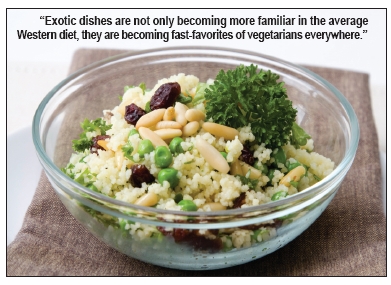 Food the Natural Way
Food the Natural Way
While anything eaten uncooked is raw, strictly speaking, the foods most often marketed in this consumer category include fruits, vegetables, nuts, seeds, sprouts, sea vegetables and superfoods, according to Brian Miller, Northwest representative and raw foods expert for a company specializing in raw foods, Ojio, Moorpark, CA. “Raw foods have the most vibrant tastes of any food and many culinary chefs are now taking the approach of incorporating more raw foods in their dishes for their authentic, fresh and intrinsically tantalizing and intricate flavors,” Miller says.
The vegan, certified organic products often found in this category undergo little to no processing. In the case of Ojio, products are wildcrafted and see little treatment, other than stone grinding and milling into a powder, before hitting store shelves, Miller explains. “Nutritional reasons for a raw food approach are primarily the presence of natural enzymes and other nutrients that are not modified or destroyed with heat and especially high heat,” he says. 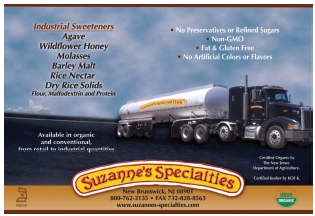
Orr reminds us of the importance of heating some foods, however. She says there may be confusion among consumers about raw foods. They are looking for the beneficial probiotics present in the raw food, but she says, “Some foods do need cooking to help kill harmful bacteria and while I understand the thought behind getting good bacteria into the body, there needs to be more education around which foods can be safely eaten in raw form.”
Part of their goal as a raw foods distributor, according to Miller, is to fill nutritional gaps in a standard vegetarian and vegan diet by offering nutrient-rich foods, sourced from pristine environments with clean soil and water. “Hemp seeds and goji berries offer complete protein (containing all essential amino acids). CamuCamu powder and maca powder offer important nutrients found in much smaller quantities in traditional vegetarian and vegan fare,” he says. Other products seek to fill niches, such as agave nectar in its raw form, which serves as a suitable solution for vegans seeking an organic plant-based sweetener.
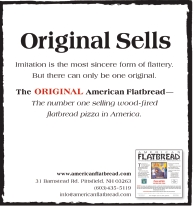 Exotic products such as hemp seeds and coconut oil, offered by raw foods companies like Miller’s, have been popular with indigenous populations for centuries, he says, while adding, “One of the limitations is potentially the cost. They are imported items and great care is taken to ensure quality, so they may cost more than low-quality proteins and oils.”
Exotic products such as hemp seeds and coconut oil, offered by raw foods companies like Miller’s, have been popular with indigenous populations for centuries, he says, while adding, “One of the limitations is potentially the cost. They are imported items and great care is taken to ensure quality, so they may cost more than low-quality proteins and oils.”
Fillat has been seeing a groundswell of support for raw foods for a while now. “Man, the industry is booming, at least in my local health food store,” she says. She says that raw milk is a particularly potent choice. Without pasteurization, its shelf life is limited, but even so, Fillat says, “It’s a powerful food.”
Whether a consumer’s diet is omnivorous, vegan, Paleo (i.e., eating like Paleolithic man), one of the many types of vegetarianism or anything else under the sun, they will benefit from eating wholesome food. “People are getting smarter about the way they shop and eat. There is a lot of media surrounding the benefits of eating real food,” says Bosgraaf. Fillat hopes the end result of this trend is an organic seal on most vegetarian products. “Companies are trying to create products that deal with all allergies, gluten, dairy, soy etc. So as they taste better, more people will buy them, and then soon, hopefully, they will be organic as well,” she says.
Accommodating clients with a restricted diet will help them make healthier choices and open doors to new favorites. Ryan says, “In deciding where to shop, 73% of US consumers rate ‘has outstanding customer service’ as important and 67% rate ‘has employees who can answer questions and handle problems without talking to a supervisor’ as important.” So, making yourself and your staff a resource on vegetarian/vegan issues will go a long way.
Also, be on the lookout for new product launches that are sure to please these clients. For manufacturers, “Finding vegan ingredients is a challenge, but it is becoming easier as time goes by,” says Colavito. Being selective with how you stock your vegetarian shelves, however, is important for consumer health. “I wish retailers would just be more stringent on what they let in. They are one piece of the puzzle, but a huge piece,” says Fillat.
Miller emphasizes that education and attractive packaging are important in drawing consumers to special diet products; people simply want to learn about products before they eat them. “Their curiosity about them has to be satisfied if they are going to incorporate them into their kitchens,” he says. Considerations like these on the part of retailers will help clients to transition into, maintain and diversify these special diets for more gratifying and healthy eating. WF
Published in WholeFoods Magazine, March 2011

